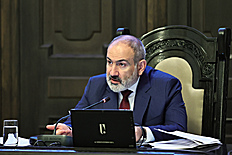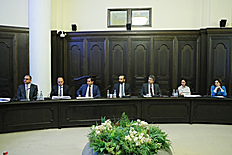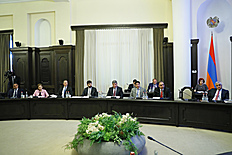Statements and messages of the Prime Minister of RA
Everyone can find the reasons for the existence of the Nagorno-Karabakh Defense Army in the propaganda and actions of Azerbaijan. Prime Minister
Prime Minister Nikol Pashinyan chaired a regular Cabinet meeting. At the beginning of the session, Prime Minister Pashinyan referred to the humanitarian crisis in Nagorno-Karabakh resulted by Azerbaijan's illegal blocking of the Lachin Corridor and other issues.
In particular, the Prime Minister noted.
"Dear participants of the Cabinet meeting,
Dear people,
As a result of the illegal blockade of the Lachin Corridor, the humanitarian crisis in Nagorno Karabakh is intensifying day by day. As you know, after the provocation near the Hakari bridge on June 15, Nagorno-Karabakh is deprived of all kinds of goods supplies. Even the Russian peacekeepers stationed in Nagorno-Karabakh do not have the opportunity to deliver supplies, because the Lachin corridor is blocked completely.
Natural gas and electricity supplies to Nagorno Karabakh have also been disrupted by Azerbaijan for months. At the same time, we see increasing Azerbaijani rhetoric and propaganda, especially against Nagorno-Karabakh. Azerbaijan's baseless accusations against the Republic of Armenia do not stop, in particular, Azerbaijan continues to demand that Armenia withdraw the units of the Armenian army from Nagorno Karabakh in the conditions that the Republic of Armenia does not have soldiers in Nagorno Karabakh. I record once again that there is no army of the Republic of Armenia in Nagorno-Karabakh, the NK Defense Army operates in Nagorno-Karabakh, and everyone can find the reasons for its existence in the official propaganda and actions of Azerbaijan, the undisguised aim of which is to subject the Armenians of Nagorno-Karabakh to ethnic cleansing and genocide.
In fact, we see the creeping implementation of that policy today in Nagorno-Karabakh. Part of that Azerbaijani policy of ethnic cleansing is also the targeting of those international organizations and countries which give an objective assessment of the humanitarian crisis in Nagorno-Karabakh and Azerbaijan's actions.
In this regard, Azerbaijan has launched a large-scale counter-propaganda for months against France, the official and public platforms of which are raising targeted assessments and alarms about the illegal steps taken by Azerbaijan against the Armenians of Nagorno-Karabakh. The propaganda against France is aimed to prevent other countries from assessing the humanitarian crisis in Nagorno-Karabakh. Armenia, in its turn, thanks France, should take all measures so that more and more countries and international organizations make appropriate assessments regarding the humanitarian crisis in Nagorno-Karabakh.
Our response to this whole situation must be continued diplomatic work. No matter how hard it is morally, politically or emotionally, we must not lose our temper under any circumstances.
Azerbaijan continues to accuse Armenia of not fulfilling its obligations to ensure transport links through its territory, with some ambiguous interpretations of the corridor. Here, too, I have to repeat that Armenia has never made any written or oral commitment related to the corridor and will never accept any such interpretation. The fact that Armenia has not undertaken any corridor-related obligations can be seen by anyone reading the trilateral declaration of November 9, 2020.
As for the unblocking of regional communications under the sovereignty and jurisdiction of the countries, Armenia has repeatedly declared and declares that it is ready for this. A draft decision of the Armenian government has been put into official circulation for a long time, which envisages the establishment of three checkpoints on the Armenian-Azerbaijani border by Armenia. That decision is not accepted because of the unconstructive approach of Azerbaijan, which has not even initiated a similar process and does not want to give Armenia a road. In other words, the logic is that the same decision should also be made by Azerbaijan, so that both Armenia and Azerbaijan have these checkpoints, so that the regional transport infrastructures are unblocked. Azerbaijan is not doing this and Azerbaijan's approach is like this because it has not given up its 30-year policy of blockade of the Republic of Armenia.
Azerbaijan also continues to accuse Armenia of mine-placing issues. First, the International Court of Justice, by its decision of February 22 of this year, denied the accusations directed at Armenia over mine-placing, and then, in order to show its sincerity and determination regarding the settlement of relations, the Armenian side in previous years transferred to Azerbaijan the maps of all the territories and minefields under the latter's control, which are being used today in Azerbaijan for large-scale demining operations. And Azerbaijan did not take any adequate steps in response to this, to this day it continues to illegally keep Armenian prisoners of war and use them as a political bargaining factor.
Dear participants of the Cabinet meeting, dear people,
No matter how difficult the state of affairs is in terms of moral, political, security, and emotional aspects, the realization of the peace agenda has no alternative. The rights and security of the Armenians of Nagorno-Karabakh should be addressed within the framework of the international mechanisms of the Baku-Stepanakert dialogue, and a peace treaty should be signed between Armenia and Azerbaijan. The progress recorded in the recent Armenia-Azerbaijan negotiations in Washington is not tangible, but there is some progress. In the near future, my meeting with the president of Azerbaijan is planned in Brussels, through the mediation of the President of the European Council.
Unfortunately, the text of the peace treaty between Armenia and Azerbaijan is not yet ready for signing. I hope to materialize the positive things recorded in Washington during the upcoming meeting. All issues should be resolved diplomatically. Thank you”.


